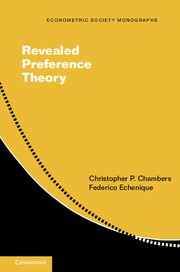Book contents
- Frontmatter
- Dedication
- Contents
- Preface
- 1 Mathematical Preliminaries
- 2 Classical Abstract Choice Theory
- 3 Rational Demand
- 4 Topics in Rational Demand
- 5 Practical Issues in Revealed Preference Analysis
- 6 Production
- 7 Stochastic Choice
- 8 Choice Under Uncertainty
- 9 General Equilibrium Theory
- 10 Game Theory
- 11 Social Choice and Political Science
- 12 Revealed Preference and Systems of Polynomial Inequalities
- 13 Revealed Preference and Model Theory
- References
- Index
- Miscellaneous Endmatter
13 - Revealed Preference and Model Theory
Published online by Cambridge University Press: 05 January 2016
- Frontmatter
- Dedication
- Contents
- Preface
- 1 Mathematical Preliminaries
- 2 Classical Abstract Choice Theory
- 3 Rational Demand
- 4 Topics in Rational Demand
- 5 Practical Issues in Revealed Preference Analysis
- 6 Production
- 7 Stochastic Choice
- 8 Choice Under Uncertainty
- 9 General Equilibrium Theory
- 10 Game Theory
- 11 Social Choice and Political Science
- 12 Revealed Preference and Systems of Polynomial Inequalities
- 13 Revealed Preference and Model Theory
- References
- Index
- Miscellaneous Endmatter
Summary
In this book, we have studied the concept of empirical content in disparate environments. To conclude our study, we wish to suggest that there is a unifying theme behind these exercises. The idea of the empirical content of a theory as the set of all falsifiable predictions of the theory is generally applicable, and subject to formal study.
A theory can make predictions which are non-falsifiable. A case in point is the theory of representation by a utility function. Recall Theorem 1.1. The theorem implies that if a preference relation over R+n possesses a utility representation, then there is a countable set Z ⊆ R+n such that for all x, y ∈ X for which, there exists z ∈ Z for which. This implication of the theory of utility is not falsifiable. To demonstrate that the theory has been falsified, one would need to establish the non-existence of such a set Z. Doing so involves checking, one-by-one, every possible countable subset Z of R+n, a task which can never be completed.
A first and basic issue in understanding empirical content has to do with universal vs. existential axiomatizations. The idea was already introduced in Chapters 9 and 12, where we saw the removal of existential quantifiers as a source of testable implications. The issue of universal and existential axioms goes back to Popper (1959), who thought that a theory with a universal description is falsifiable, while an existential theory is not.
Popper offers the example of the theory that claims “all swans are white.” This theory is universal, in the sense that it states a property of all swans, or “universally quantifies over swans.” It is easy to see that, in principle, such a theory can be falsified by finding a single swan that is not white. Contrast with Popper's example of an existential theory: that “there exists a black swan.” The existential theory cannot be falsified. Falsifying the theory would involve collecting all possible swans and verifying that each one is not black.We could only do this if we could somehow be sure to have exhaustively checked all the swans in the universe.
- Type
- Chapter
- Information
- Revealed Preference Theory , pp. 186 - 197Publisher: Cambridge University PressPrint publication year: 2016
- 10
- Cited by

